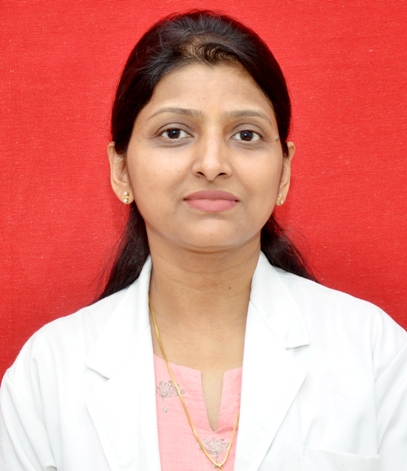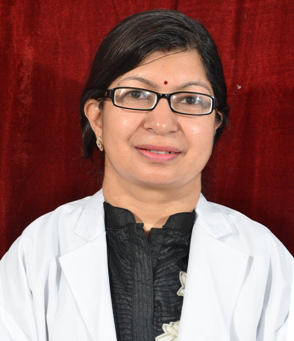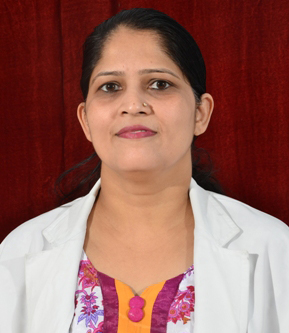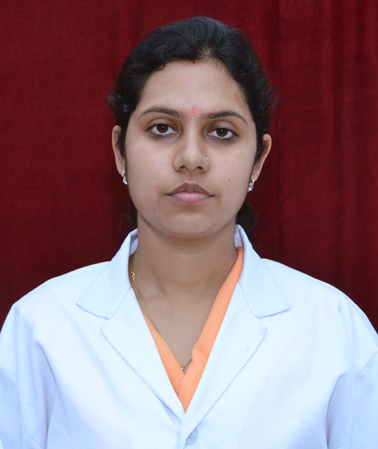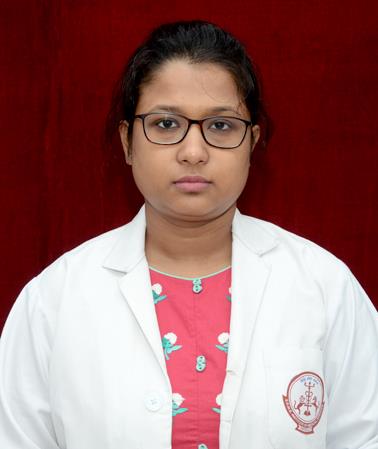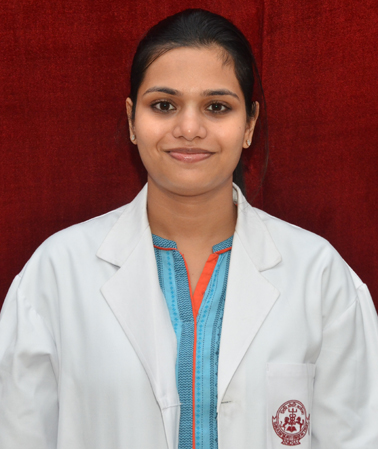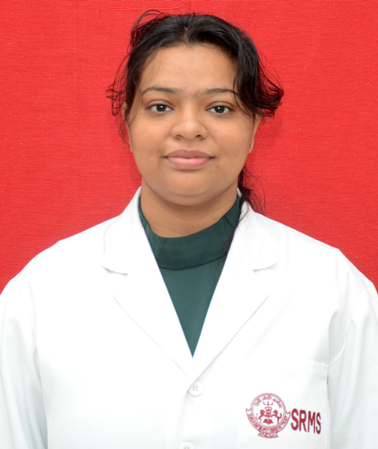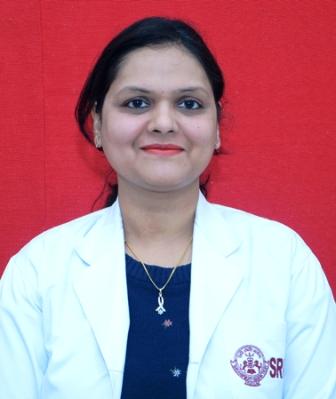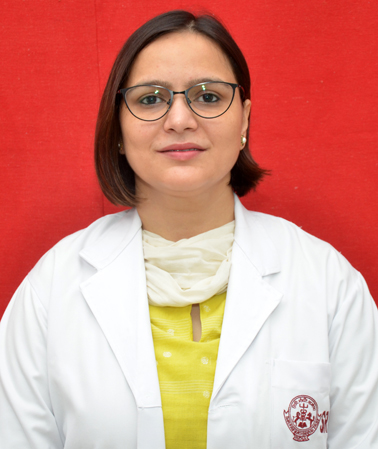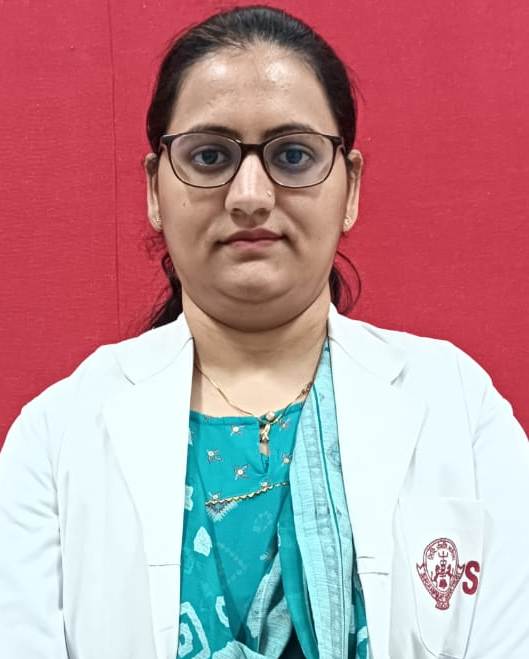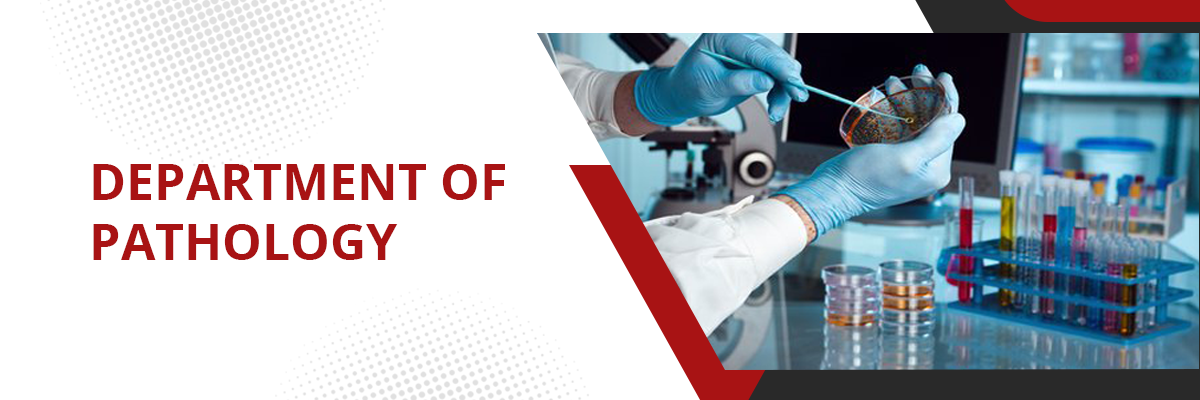
About
The Department of Pathology provides comprehensive diagnostic services with an emphasis on ensuring the quality of services including turn-around-time thereby helping and guiding the clinicians in proper patient management. The department started in 2002 and has shown an exponential growth since then. The various labs that function under this department are Histopathology, Cytology, Hematology and Clinical Pathology. All the labs are modernized, fully automated and well-equipped with trained personnel and state-of-the-art instruments like 6-part hematology Analyzer, automated ESR Analyzer, fully automated coagulometer, HPLC, automated urine analyzer, liquid based cytology, automated histopathology laboratory equipment and fully automated immunohistochemistry stainer. Immunofluorescence testing and renal pathology has been introduced recently. The department handles over 11,000 histopathology, 9000 cytopathology and 4500 immunohistochemistry requests per year and has an extensive panel of over 50 immunohistochemistry markers. A 24x7 Hematology and Clinical Pathology laboratory caters to in-patients and out-patients and processes about 1800 tests per day.
The Department is dedicated to understanding the basis of disease and delivering excellence in teaching. A pentahead microscope and a decahead microscope together with trinocular microscopes with integrated camera and television attachment aid in providing quality medical education to undergraduate and post graduate medical students by skilled and experienced teachers. With an annual intake of six MD students the pathologists trained by our department are competent and well prepared to play key roles in patient care and research. The departmental museum houses nearly 250 gross pathology specimens which enable the students to get a better insight of the disease processes. The department is active in research, particularly in the area of cancer, and also participates in various external quality assurance programs to achieve excellence in patient care.
Why is it Done ?
We take pride in offering comprehensive and advanced pathology services that play a crucial role in diagnosing and treating various medical conditions. Our state-of-the-art Pathology Department is equipped with cutting-edge technology and staffed by skilled professionals who are committed to delivering accurate and timely results. But you might wonder, why exactly are pathology services done? Let’s delve into the reasons behind the significance of pathology in healthcare.
Pathology is the branch of medical science that deals with the study of diseases and their causes, mechanisms, and effects. It involves the examination of tissues, cells, body fluids, and organs to identify abnormalities and diagnose illnesses. Pathology services encompass a wide range of tests and analyses that provide essential insights into a patient’s health condition.
Why Are Pathology Services Done?
Diagnosis: One of the primary reasons for conducting pathology tests is to aid in the accurate diagnosis of various diseases. By analyzing tissue samples, blood, urine, and other bodily fluids, pathologists can identify the presence of pathogens, abnormal cells, and biochemical imbalances that might indicate a specific disease or condition.
Disease Monitoring: Pathology services are also essential for monitoring the progression of chronic diseases and assessing the effectiveness of treatment. Regular pathology tests help healthcare providers track changes in a patient’s condition over time, enabling them to adjust treatment plans as necessary.
Screening and Early Detection: Many diseases, such as cancer, are more manageable when detected at an early stage. Pathology plays a crucial role in early detection through screening tests that identify abnormalities before noticeable symptoms arise. Early diagnosis often leads to better treatment outcomes and improved patient prognosis.
Treatment Planning: Pathology results provide critical information that guides healthcare professionals in designing personalized treatment plans. Different diseases require different approaches, and pathology helps determine the most appropriate course of action based on the patient’s specific condition.
Research and Medical Advancement: Pathology is not only about individual patient care but also contributes significantly to medical research. Pathologists study disease patterns, genetic mutations, and treatment responses, which contributes to the development of new therapies, drugs, and medical interventions.
Public Health and Disease Control: Pathology services play a vital role in disease surveillance, outbreak investigation, and public health management. Identifying and monitoring infectious agents through pathology testing helps prevent the spread of diseases within communities.
Genetic and Molecular Analysis: Advances in pathology have led to a better understanding of genetic and molecular factors that influence disease development. Genetic testing and molecular analysis aid in identifying hereditary conditions and predicting an individual’s susceptibility to certain diseases.
How Long will it Take ?
At SRMS Hospital, we understand the importance of timely and accurate pathology services in diagnosing and managing medical conditions. When patients entrust us with their health, we prioritize delivering results promptly without compromising on quality. The duration it takes to complete various pathology tests depends on several factors, and we aim to provide you with a clear understanding of the expected timelines.
Efficient Workflow: Our pathology department is equipped with state-of-the-art technology and a skilled team of pathologists, technicians, and support staff who work collaboratively to ensure a streamlined and efficient workflow. This enables us to process a wide range of tests promptly while maintaining precision and reliability.
Common Pathology Tests and Turnaround Times: The time required to complete a pathology test can vary based on factors such as the type of test, the complexity of the analysis, and the volume of tests being conducted. Here are some common tests and their approximate turnaround times:
Complete Blood Count (CBC): This essential test, which examines various components of blood, can typically be processed within a few hours to a day.
Blood Chemistry Panels: These panels assess various biochemical markers in the blood. Results are usually available within 1 to 2 days.
Urinalysis: A urine test to detect various health conditions. Results can often be obtained within 1 day.
Biopsy Analysis: For tissue samples obtained during surgery or other procedures, results can take several days to a week, depending on the complexity of the analysis.
Cytology: Analysis of cells for conditions such as cancer. Turnaround time can vary from a few days to a week.
Microbiology Cultures: Culturing and identifying microorganisms from samples like blood or urine can take 2 to 5 days or more, depending on the type of microorganism.
Molecular Tests: Tests like PCR for detecting specific genetic markers or infectious agents can have a turnaround time of a few hours to several days, based on the test complexity.
Prompt Reporting: At SRMS Hospital, we prioritize delivering accurate results in a timely manner. Our reporting system is designed to efficiently communicate results to healthcare providers, ensuring that they can make informed decisions about patient care without unnecessary delays. In urgent situations where rapid results are crucial for patient management, our pathology team is committed to expediting the testing process without compromising accuracy. We understand the significance of swift and reliable results in critical cases.
What happen during procedure ?
When it comes to healthcare, accurate diagnostics play a crucial role in determining the appropriate course of treatment for patients. Pathology services at SRMS Hospital are dedicated to providing comprehensive and precise diagnostic insights, enabling our medical team to make informed decisions about patient care. Let’s delve into what happens during a pathology procedure at SRMS Hospital and how it contributes to better healthcare outcomes.
Step 1: Sample Collection The first and foremost step in any pathology procedure is the collection of samples. These samples can range from blood, tissue, urine, or other bodily fluids. Our experienced and skilled medical professionals ensure that the collection process is carried out with the utmost care and hygiene, prioritizing patient comfort.
Step 2: Handling and Transport Once the samples are collected, they are carefully labeled, packaged, and transported to the laboratory. Maintaining the integrity of the samples is essential to ensure accurate test results. The samples are handled in a controlled environment to prevent contamination and degradation.
Step 3: Processing In the laboratory, the collected samples undergo various processing techniques depending on the type of test required. For instance, blood samples might be centrifuged to separate the different components, while tissue samples may undergo specialized preparation procedures for microscopic examination.
Step 4: Analysis The analysis phase is where the real magic happens. Our skilled pathologists and laboratory technicians use cutting-edge equipment and techniques to examine the samples in detail. This might involve staining slides to highlight specific cellular structures, using advanced imaging technologies, or performing molecular tests to detect genetic markers.
Step 5: Interpretation and Reporting Once the analysis is complete, our pathologists interpret the findings based on their expertise. They correlate the results with the patient’s medical history and other relevant information to provide accurate and meaningful diagnostic insights. The results are compiled into comprehensive reports that are shared with the patient’s primary physician.
Step 6: Consultation In certain cases, a consultation between the pathologist and the primary physician may take place. This allows for a collaborative discussion about the results, their implications, and the best course of action for the patient’s treatment. This multidisciplinary approach ensures that patients receive the most appropriate care tailored to their specific condition.
Step 7: Quality Control At SRMS Hospital, quality control is a top priority. Rigorous quality checks are performed throughout the entire pathology process to ensure the accuracy and reliability of the results. This commitment to quality enhances the overall patient care experience.
What Happens After The Procedure?
Undergoing a medical procedure, no matter how routine, can be a significant experience for patients. After a pathology procedure at SRMS Hospital, we understand the importance of providing comprehensive care beyond the procedure itself. This article aims to guide you through the post-procedure phase, ensuring a smooth and comfortable recovery while answering common questions about what to expect after your pathology service at SRMS Hospital.
Immediate Post-Procedure Care: Once your pathology procedure is complete, our skilled medical team will ensure your immediate comfort and safety. Depending on the type of procedure you’ve undergone, you may spend some time in a recovery area. Here, trained professionals will monitor your vitals and ensure that you are stable before you are moved to a regular room or discharged.
Monitoring and Observation: Some procedures might require additional observation before you can leave the hospital. Our medical staff will closely monitor your condition, providing any necessary treatments or medications to manage discomfort or complications. They will also provide clear instructions on any post-procedure restrictions, such as avoiding heavy lifting or specific activities.
Recovery at Home: Once you’re discharged from the hospital, it’s important to follow any instructions provided by your healthcare team. This could include taking prescribed medications, changing dressings, and adhering to dietary restrictions if applicable. You may also be advised to rest and gradually increase your activity levels as your body heals.
Managing Discomfort: It’s not uncommon to experience some discomfort after a pathology procedure. This discomfort might range from mild pain or swelling to temporary changes in bodily functions. Your healthcare provider will guide you on managing these symptoms, which could involve over-the-counter pain relievers, specific exercises, or other measures.
Follow-up Appointments: To ensure your recovery is progressing as expected, your healthcare team will schedule follow-up appointments. These appointments allow the medical professionals to assess your healing process, address any concerns you might have, and make any necessary adjustments to your post-procedure care plan.
Monitoring Results: One of the main reasons for undergoing a pathology procedure is to obtain accurate diagnostic results. After your procedure, the collected samples will be carefully analyzed by our skilled pathologists. Once the results are available, your healthcare provider will discuss them with you, providing insights into your health status and guiding any further actions that may be necessary.
Communication and Support: Throughout your post-procedure journey, SRMS Hospital’s dedicated medical team is here to support you. If you have questions, concerns, or experience any unexpected symptoms, do not hesitate to reach out to your healthcare provider. Open communication ensures that your recovery progresses smoothly and any potential issues are addressed promptly.
FAQ
1. What is Pathology and what role does it play in healthcare?
Pathology is the medical specialty that focuses on the study and diagnosis of diseases by examining bodily fluids, tissues, and organs. It plays a crucial role in healthcare by providing valuable insights into the nature and cause of diseases, which aids in accurate diagnosis, treatment planning, and monitoring of patients’ health.
2. What services does the Pathology Department at SRMS Hospital offer?
The Pathology Department at SRMS Hospital offers a comprehensive range of services including but not limited to blood tests, urine tests, tissue biopsies, cytology (study of cells), molecular testing, and histopathology (examination of tissues). These services assist in diagnosing various medical conditions and guiding treatment decisions.
3. How do I schedule an appointment for pathology tests?
To schedule an appointment for pathology tests, you can either call our hospital’s appointment hotline or visit the hospital in person. Online appointment scheduling may also be available through the hospital’s official website or app. Walk-in appointments are accepted but scheduling in advance is recommended for better convenience.
4. Are there any specific preparations required for certain tests?
Yes, some tests might require specific preparations. Fasting might be necessary before certain blood tests, such as lipid profiles and glucose tests. Your healthcare provider will provide you with detailed instructions on preparation when you schedule your test.
5. How long does it take to get the test results?
The turnaround time for test results varies based on the type of test performed. Routine blood tests and basic urine tests might have quicker results, often within a day or two. More complex tests like histopathology or molecular testing might take longer, ranging from a few days to a couple of weeks. Your healthcare provider will inform you about the expected timeframe for your specific test.
6. How are the test results delivered to patients?
Test results are typically communicated to patients through various methods, including in-person appointments, phone calls, secure online portals, or mailed reports. The chosen method will depend on the hospital’s policies and your preferences.
7. Can I get a copy of my test results for my records?
Yes, you can request a copy of your test results for your personal records. Most hospitals provide patients with a copy of their results upon request. It’s a good practice to keep your medical records organized for future reference.




